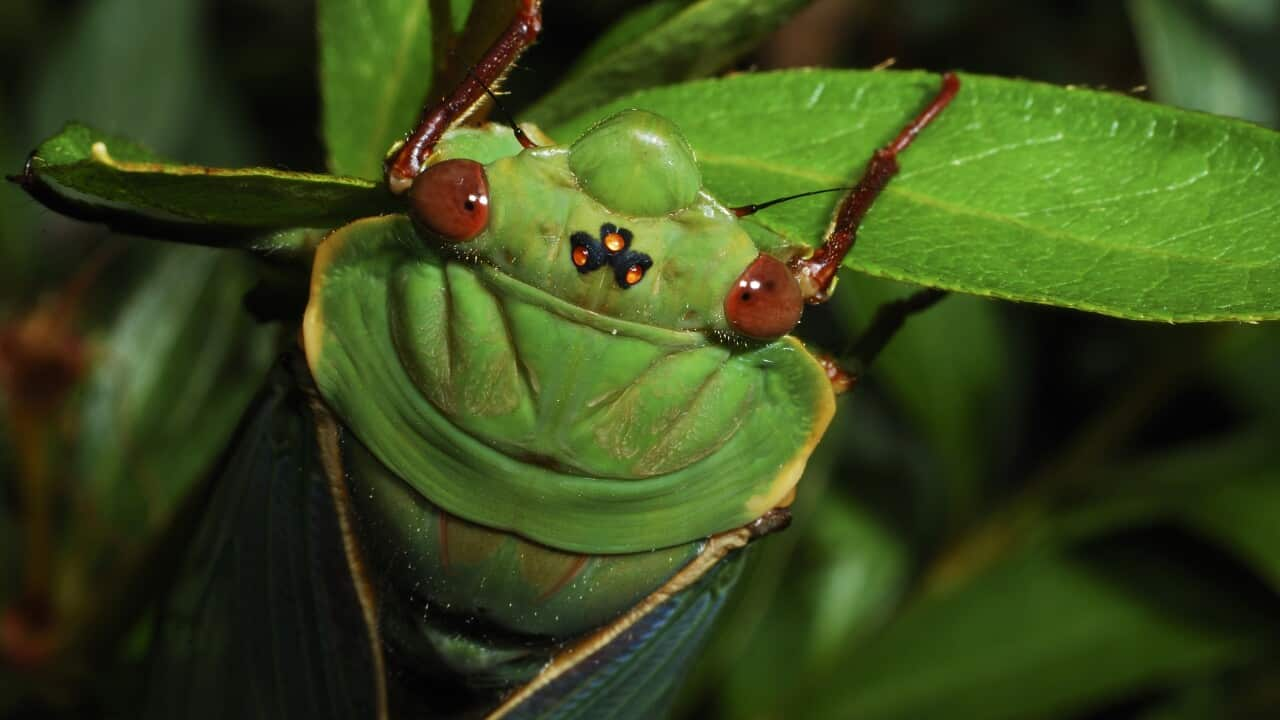There's no sound more reminiscent of an Australian summer than the buzz of cicadas.
With 200 different species of cicada in Australia, a hot summer's day down under is often characterised by the silent buzz of our cicada friends as we head on a bushwalk or enjoy a barbeque with loved ones.
Sometimes, the roar of the cicada can be so loud it makes us unable to hear others talk.
But this year, eagle-eared Australians have noticed our cicada friends feel particularly loud. And they're not wrong.
Professor David Emery is a veterinary immunologist and cicada expert. He says researchers didn't expect the cicada season to go "gangbusters" like it has this year.
"We expected a big year for Greengrocers … but we didn't expect everything else to go gangbusters as well," Emery told SBS News.
The Greengrocer is a common, loud cicada species native to Australia, often found from southern Queensland all the way down to South Australia. It lives underground and emerges every seven to eight years.
This year, they're out in full force and in much larger numbers than usual.

Red Eye cicadas cluster on a tree in North Sydney. Source: Supplied / Prof David Emery
"The moisture of the winter time and the heat and warmth in the summer and the spring has brought them out around about three weeks earlier than you'd normally see them," he said.
"They've emerged out in huge numbers and they're still emerging. It's quite extraordinary."
The re-emergence of the Greengrocer — which occurred seven years to the day in the Blue Mountains — has coincided with the arrival of other larger types of cicadas, making for a beautiful cacophony of noise.
"Now, the Razor Grinders, the Black Prince, and the Red Eye cicada are hitting their stride," he says. "It's a bit like an assembly line. The Greengrocer has started off and then the other big ones came in, but the noise will just persist and you probably won't notice the difference until after Christmas."

The Razor Grinder and Double Drummer cicadas are emerging in full-force this summer, leading to quite the buzz. Source: Supplied / Prof David Emery
"We're talking gazillions of some of them," he said, adding that NSW has seen very large numbers across forests in the coastal regions.
The season is two to three weeks ahead of schedule and is set to peak within the next week.
A lot of the loud buzz is centralised to Australia's southeast coast.
Why are cicadas so loud?
While the smaller cicadas don't make too much noise, it's the larger ones that we have to thank for the deafening roar. But why are they so loud?
Well, only male cicadas sing – and there's good reason why.
Emery likes to think of it like a nightclub. After spending four to seven years underground, cicadas only have about a month to get out and reproduce.
"Therefore, you're going to go clubbing every day and males are going to make a big song and dance in order to attract a female and do what they need to do to get their genes into the next generation," he explained.
"If you don't sing, you don't get a mate," he said. "Loudness counts. So loud cicadas tend to attract more females."
Additionally, the loud buzz of cicadas helps deter predators like birds (and humans who want to hear themselves think).
But they don't all speak over each other at once. "They tend to orchestrate themselves. They don't all compete at once."
How loud do cicadas get?
If you head into the bush and your ears start to hurt from the buzz of cicadas, that's because they're very, very loud.
Emery describes seeing some Greengrocers in the NSW Blue Mountains hit 91 decibels. That's the equivalent sound of a chainsaw.
He's also heard the Double Drummer cicada hit over 100 decibels, which is similar to the sound of an aeroplane taking off.
Some of the nosiest Double Drummers and Greengrocers can reach noise levels as high as 120 decibels at close range, according to the Australian Museum. That's loud enough to be painful to the human ear.
"It's over lawnmowers, it's up around chainsaws, up into aircraft taking off."

Professor David Emery says cicadas can exceed lawnmowers, chainsaws, and even aeroplanes on decibel levels. Source: SBS News
"I think it will be another four to seven years before we may see another season like this," he said.
"If you don't like them, well you've got that security that it's not going to happen every year.
"If you do like them, enjoy them, catch them, store them away, love them, and photograph them because they won't be out like this every year."



